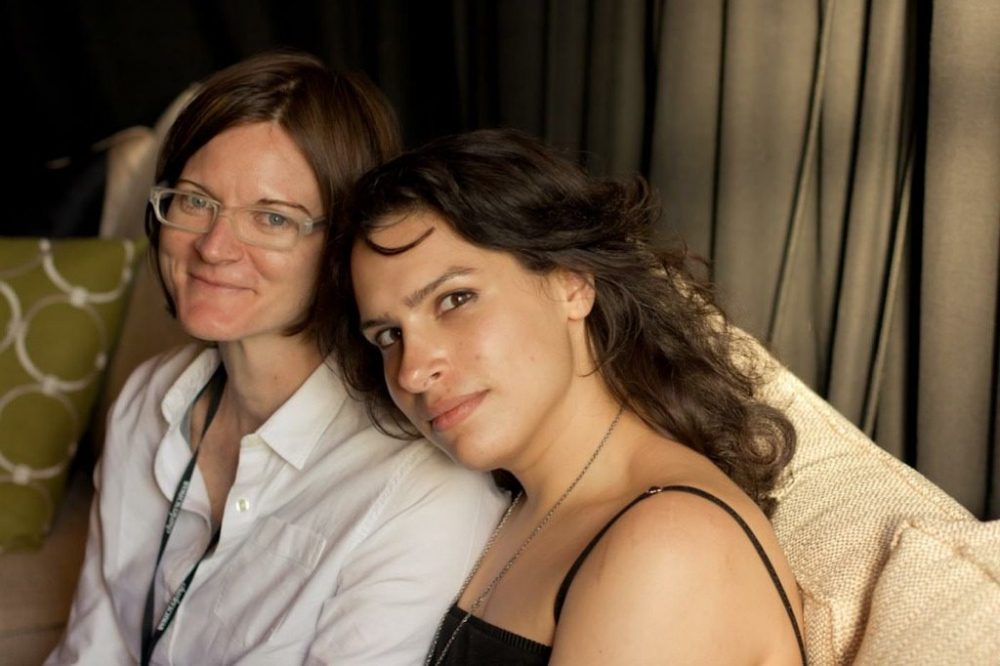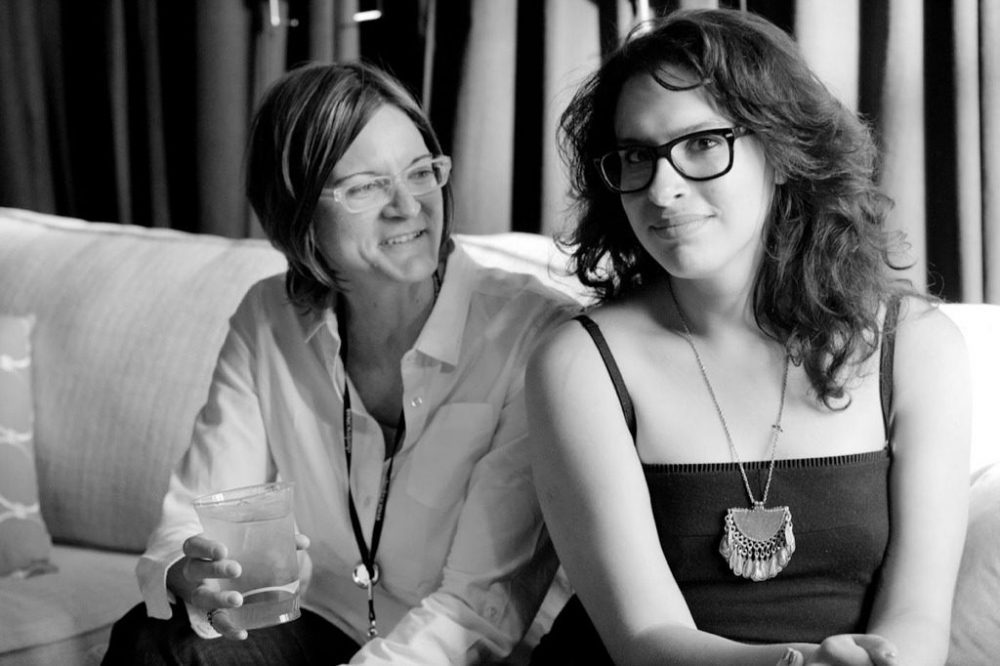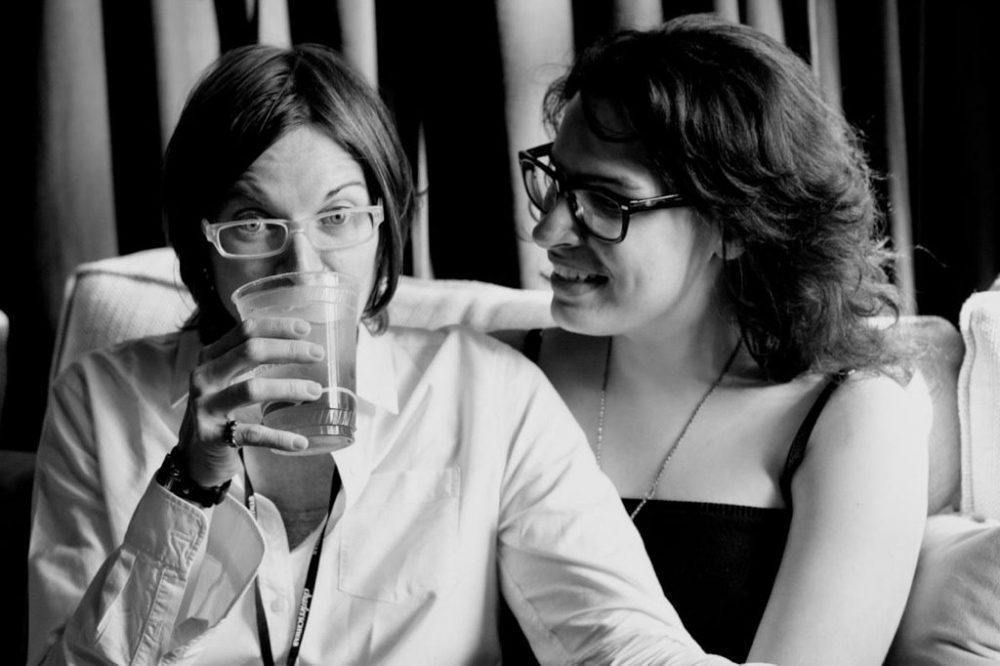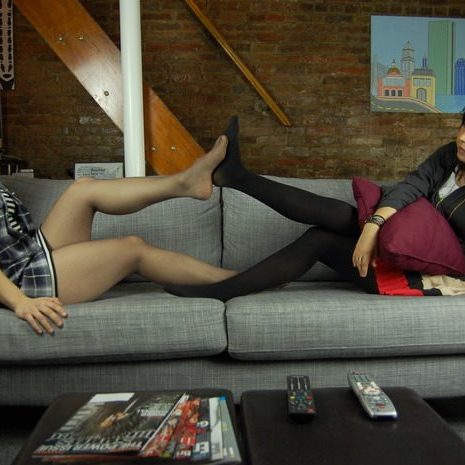
A look inside the mind of co-creator Desiree Akhavan.
Superficial, homophobic lesbians — that’s what everyone is saying about the new lesbian web series The Slope. Co-creators Desiree Akhavan and Ingrid Jungermann even say it. It’s their slogan. What about ignorant? Politically incorrect? Offensive? Intelligent? Hilarious? Can those words even co-exist? The answer is yes. The Slope makes gross generalizations, simplifying hot button topics in the most politically incorrect way and they do it intentionally to make a point. It’s hilarious. Every episode will invoke your inner feminist, making you want to engage in a heated debate about gender identity, sexual diversity and the bigotry within the LGBT community.
The dialogue is witty, intelligent and comical. Watching The Slope is a combination of watching great art and comedy, mixed with trashy reality television. Akhavan plays Desiree, a lively 20-something bisexual with a superficial streak, which resembles that of the dimmer side of reality TV. Jungermann plays Ingrid, a 30-something dyke who’s close to fitting the committed, stay-at-home, lesbian deathbed stereotype.
In our conversation with Akhavan, she told us how her experiences with dating Ingrid, living in Park Slope and being a young queer woman in Brooklyn influenced the creation of The Slope.
What about Park Slope fosters the Park Slope lesbian stereotypes that you portray on your show?
I think a lot of big cities in America have this kind of place. It’s kind of bourgeois-hippie. You know, someone who shops at the Farmers Market exclusively and looks down on people who vaccinate their children and who has really strong opinions about where their milk comes from. I think I looked around last year and I realized that I was a cliché through and through. Like from the time I started dating Ingrid to when we started working each other’s co-op shifts. I just had to laugh at myself. I kept seeing little versions of me walking around the street and thinking this is insane. We are all such a joke but in a great way.
Basically, it’s like when you look around and you’re like, ‘Oh, I’m kind of a cliché. This is kind of a thing right now.’ Like hipster is a thing. I don’t consider myself a hipster, but I definitely am a queer woman in Brooklyn right now who makes art or films. And there are a lot more of me. And we’re kind of this growing culture of kids who have gentrified various neighbourhoods in Brooklyn. In some ways I really love it, but I’m also so aware of the obnoxious aspects of it and that’s what makes me really enjoy making the show.
The obnoxious aspects, are those specific to Park Slope?
The obnoxious aspects are purely my own. I can’t attach them to any type of person or any kind of sexuality or zip code. The truth is, it is all the worst of me. And it’s also the worst of myself as a woman. In the back of my head I have all these little thoughts that I hate that pop up. I think a lot about who the most attractive woman in a room is. Most times I enter a room I’m like, ‘Who’s the hottest?’ And I hate that about myself. But you know, I’ve been conditioned to think that way. And if I’m not going to say it out loud, if I’m not going to call myself out on that, then I’m never going to get over it. Same goes for my top bottom obsession. If I don’t make fun of the fact that I always assume the more masculine person is the top, then I am going to feel ashamed and I don’t want to feel ashamed of what I think. I just think it’s funny to make fun of and the more I make fun of it maybe I’ll start to take apart some prejudices that I have and that other people have as well.
What has your experience been with making The Slope?
This experience has been really nice, well because Ingrid and I are both students at film school, and I find that we’ve been really precious about our work and spending so many years crafting things and shooting on film and making it look perfect. While we were shooting, we made an episode a week. I’d write the episode Monday. We’d shoot it Thursday and we’d edit it Sunday, and then have it online. And you know, you just can’t be precious. You get it out and if it’s not perfect, it’s not perfect, but you’re constantly doing. I think that’s been a really great lesson.
I think a lot of people, from school at least, are like, ‘I can’t believe you’re doing this. It’s so personal. It’s so embarrassing.’ Like the strap on episode especially, or the open relationship episode when we’re in bed together. And I actually just don’t feel any shame. And that’s why — I think that has to do a lot with coming out of the closet. I don’t know if you feel this way, but once you have to talk to everybody about your sexuality and who you like to fuck, and you’ve already done the most taboo thing of having to be like, ‘Ummm, I’m kind of gay’, then there’s no shame. I don’t know [laughter]. I feel like if my work isn’t perfect, then I’m just going to still put it out. I’m still going to do it because it will make me do more.
Most definitely, everything else is definitely not as difficult to talk about once you’ve come out.
[Laughs] Yeah, which I think is amazing. I really like meeting other queer people who, well who do all kinds of things, because I find your threshold is just different for pain or for exposure. You’ve already done the craziest thing you could possibly do, which is be brutally honest with yourself and the people around you about who you are. Which isn’t required of people, and I know this because I’m bisexual. I’ve had boyfriends. I’ve had a very straight life. And it completely changed the minute I started dating Ingrid. And that’s where I think a lot of inspiration [came from] for wanting to make The Slope.
Check out season 1 and the first 3 episodes of Season 2 on their website. If you haven’t yet fallen in love with The Slope, check out the first episode below.
Episode 1: “Miserable Animals” from The Slope on Vimeo.



